

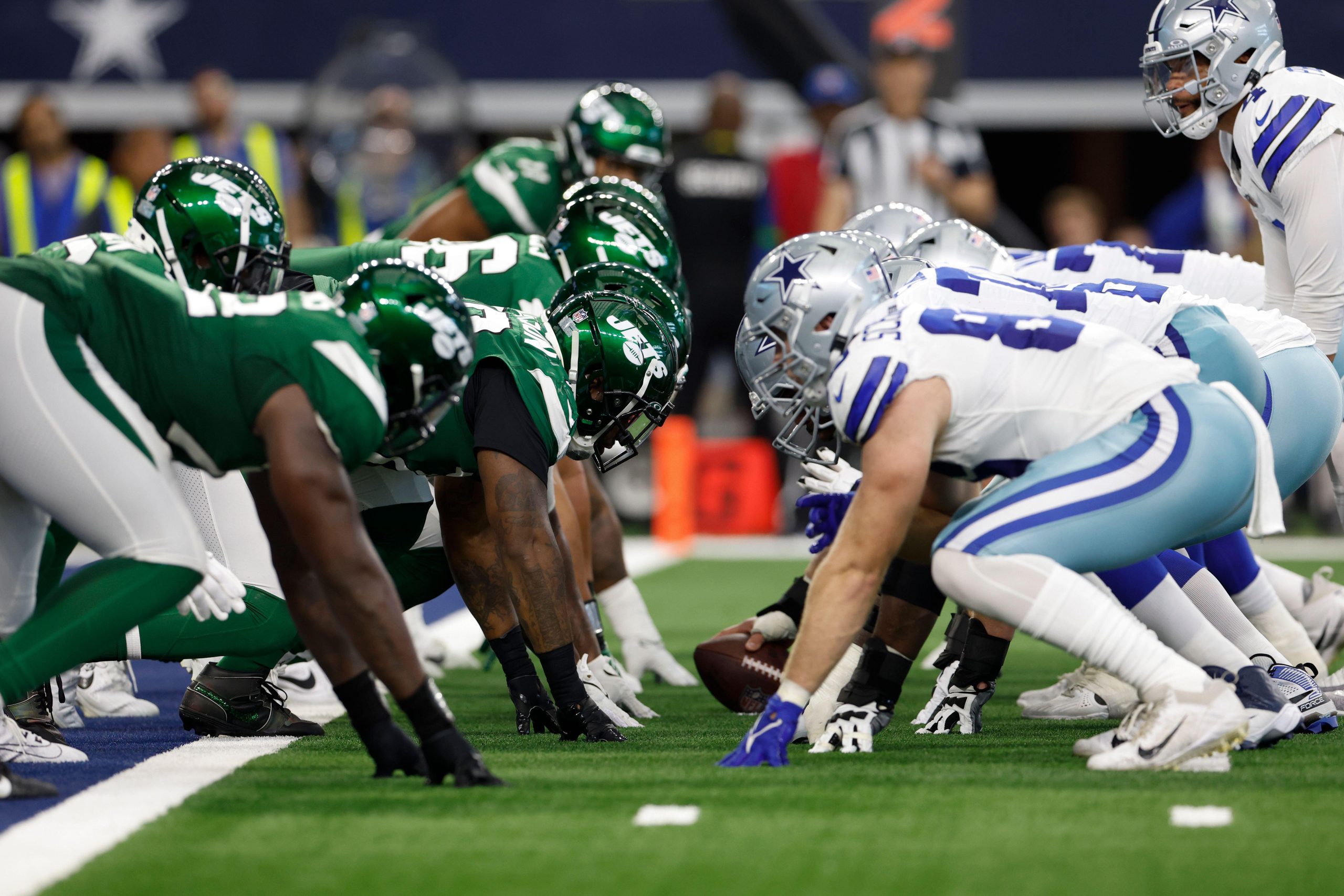
• Youth and Haason Reddick‘s addition propel the Jets to No. 1: New York lost John Franklin-Myers and Bryce Huff this offseason but still boasts tons of talent, including star interior defender Quinnen Williams.
• The 49ers remain loaded up front: Nick Bosa is a perennial Defensive Player of the Year candidate, Javon Hargrave is close to as good as it gets as an interior rusher and the team added Leonard Floyd as a complement on the outside opposite Bosa.
• Get a head start on fantasy football: Use PFF’s fantasy football mock draft simulator to create real live mock draft simulations to get ready for your live draft!
Estimated Reading Time: 15 minutes
In the ever-evolving NFL landscape, the defensive line remains a critical component of a team’s success.
As we dive into our comprehensive ranking of all 32 teams’ defensive lines, we’ll assess the talent and depth at each position, including 3-4 outside linebackers as edge rushers and therefore part of the defensive line for the purposes of this article.
From dominant pass-rushers to stout run defenders, we’ll break down the strengths and weaknesses of each unit, providing an in-depth analysis of the league’s best and most promising defensive fronts.
QB | RB | WR | TE | OT | C | G | DI | EDGE | LB | CB | S
The Jets have a fearsome defensive line, even with a couple of offseason departures in the form of John Franklin-Myers and Bryce Huff. Those were offset at least in part by acquiring Haason Reddick, and could be entirely eclipsed if Jermaine Johnson and Will McDonald IV take steps forward.
Quinnen Williams is one of the best and most disruptive defensive linemen in the game, making the Jets as good as it gets on the defensive line.
Even with the loss of Arik Armstead this offseason, the star power from this defensive line is too good to ignore. Nick Bosa is a perennial Defensive Player of the Year candidate, racking up 95 quarterback pressures in the 2023 regular season. Javon Hargrave is close to as good as it gets as an interior rusher, and the team added Leonard Floyd as a complement on the outside opposite Bosa.
Depth is an issue, but the top end of this group is outstanding.
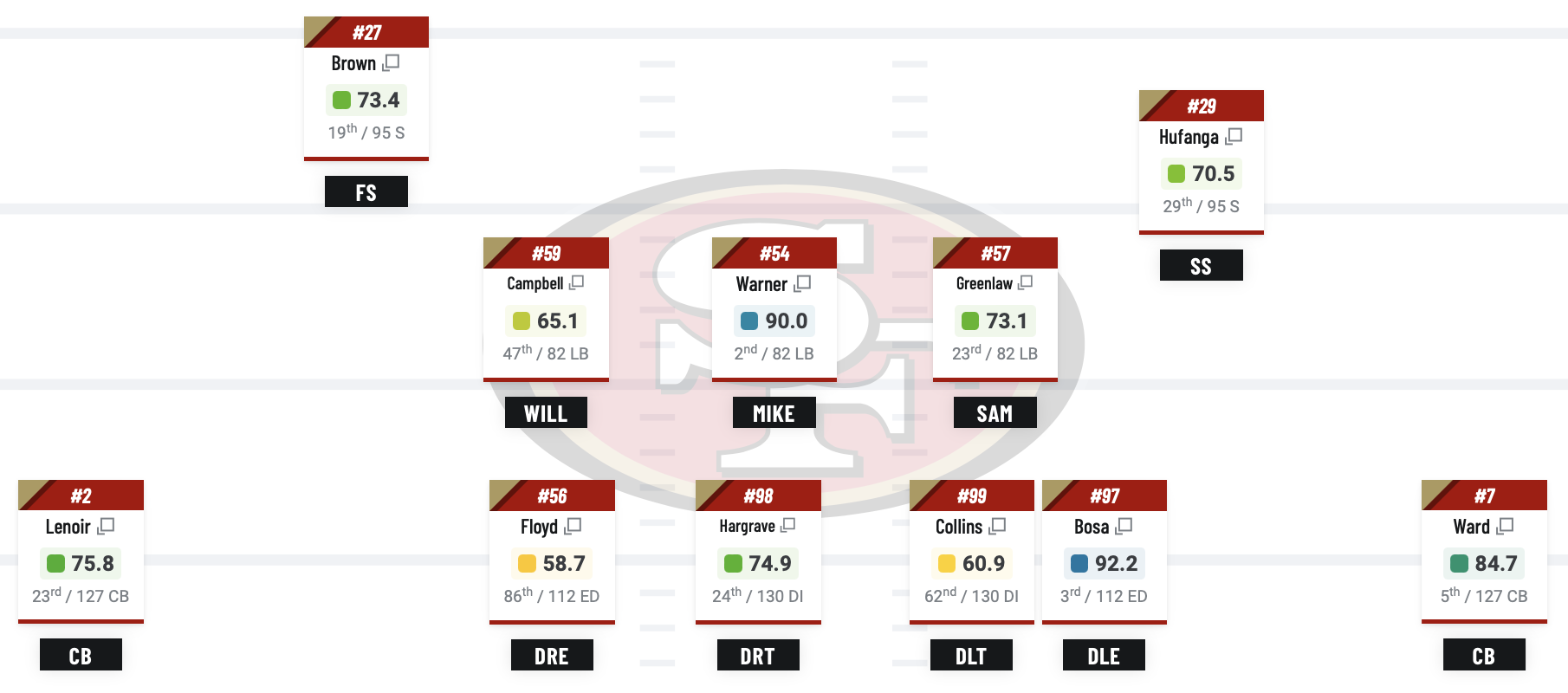
For the first time in a while, the Eagles have some questions along their defensive line. Their depth is still outstanding, but it isn’t as proven as it has been in the past. Jalen Carter was a dominant force out of the gate as a rookie before cooling off in the second half of the season on his way to an 87.4 overall PFF grade.
Bryce Huff is a significant addition but may not be an upgrade over Haason Reddick on the edge, while young players like Jordan Davis and Nolan Smith need to establish themselves as the dominant forces the players they are replacing did in the past.
For a while, the Lions had Aidan Hutchinson and not much else along the defensive line. Now, they will deploy D.J. Reader and an improved Alim McNeill along with Marcus Davenport on his latest prove-it deal.
This is unquestionably the best group the Lions have had around Hutchinson, who himself racked up 101 quarterback pressures last season on his way to a 91.2 PFF pass-rushing grade.
The Browns did the work to put help around Myles Garrett last offseason and will expect that group to cook again in 2024. Garrett rightfully won Defensive Player of the Year with a better supporting cast, and the likes of Za’Darius Smith and Dalvin Tomlinson were difference-makers to a defensive line that didn’t have nearly enough juice before they arrived.
Depth for this group is also solid, and their ceiling is even higher if some of the rotational young players can make an impact.
An elite player will take you quite far on the defensive line, and the Cowboys are this high thanks to Micah Parsons, who racked up 103 quarterback pressures in the regular season a year ago.
Demarcus Lawrence also earned a 90.0-plus PFF grade, thanks in large part to his run defense, but Dallas is lacking the depth of the teams above them and, in particular, needs to see growth from second-year nose tackle Mazi Smith.
The Colts have a very solid group of defensive linemen, arguably without the star power of the teams above them. As much as PFF loves the prospects of Laiatu Latu, it would be optimistic to expect too much from him in Year 1 as a rookie.
DeForest Buckner is the best player on this defensive line, earning an 81.8 PFF grade last season with 52 quarterback pressures and 43 defensive stops to his name.
T.J. Watt is one of the most consistent playmakers in the league when it comes to pass-rushers, and he’s not a one-man-band on this defensive line. Alex Highsmith on the other side has developed into an outstanding player in his own right, earning a 90.3 PFF grade last season with 69 quarterback pressures.
Cameron Heyward has been outstanding for so long, but last season was the first sign that perhaps age is catching up with him. If he bounces back, the Steelers will be even better than this ranking.
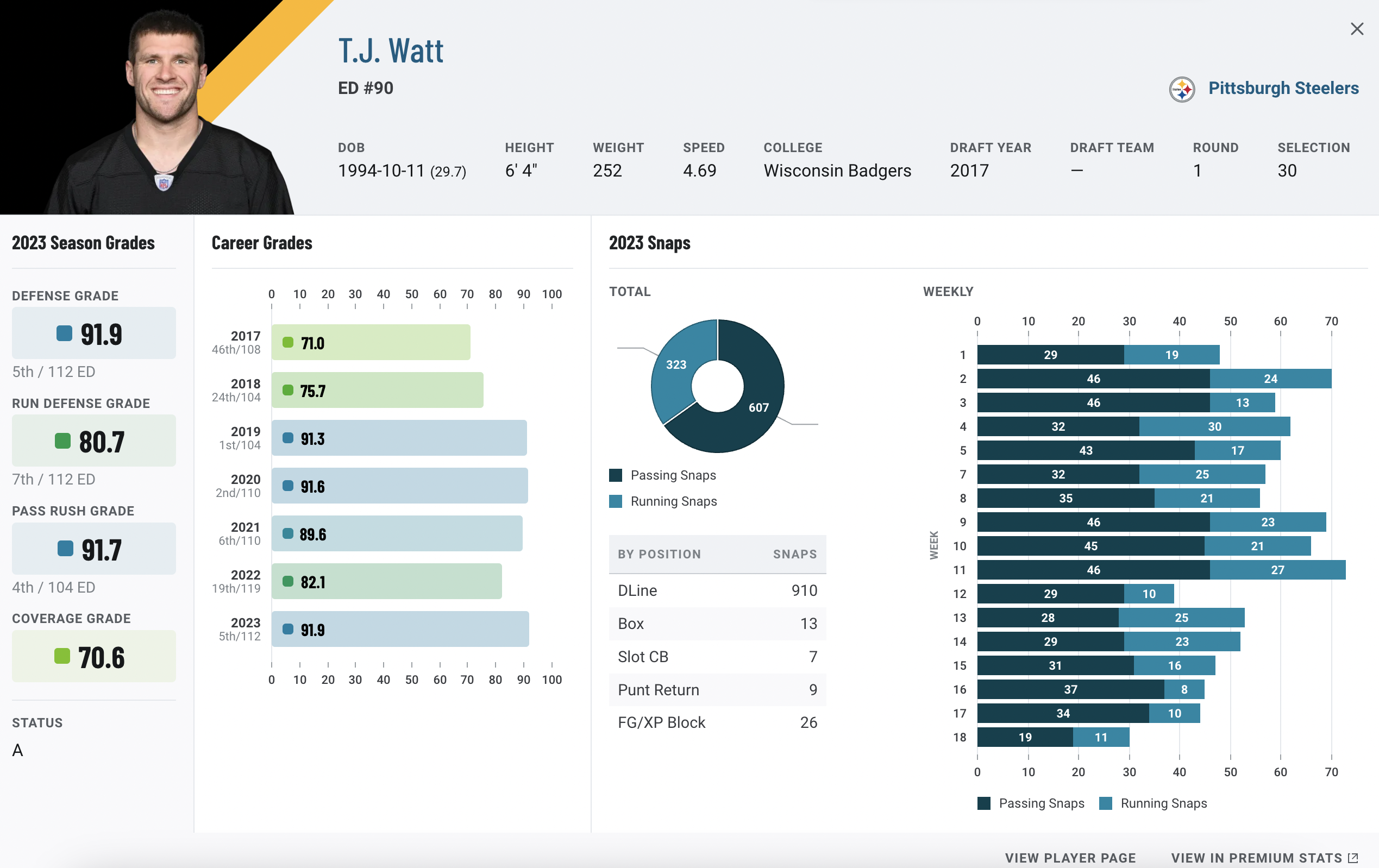
The Raiders are another team that found its superstar a while ago and has been slow to build around them. Maxx Crosby has been one of the best in football and now has help around him for the first time. Christian Wilkins was the team’s big offseason addition (literally and figuratively), while edge rusher Malcolm Koonce was so impressive last season that he may insure against Tyree Wilson if he doesn’t develop in year two.
This is the most formidable Raiders defensive line in a while.
The Texans traded back to get Will Anderson Jr. after they selected C.J. Stroud because they thought he was a true blue-chip prospect, and he backed that up as a rookie with an 81.6 PFF overall grade and 59 quarterback pressures. The team brought in Danielle Hunter to play on the opposite side, giving Houston one of the best edge tandems in the game.
The interior of this line has more questions than answers, but the edge pressure should be enough to create plenty of havoc.
The best version of Rashan Gary is one of the most impactful edge rushers in the game, but injury slowed his roll a little last season and a 79.0 PFF grade was a notable step backward even after he came back healthy.
Kenny Clark and Preston Smith are very solid players, but the key to this defensive line will be the growth of young players Devonte Wyatt and Karl Brooks inside, as well as 2023 first-round pick Lukas Van Ness.
Justin Madubuike was a breakout force for the Ravens last season. Though he wasn’t quite as dominant as his sack total, he did rack up 64 quarterback pressures and 37 defensive stops.
Michael Pierce and Travis Jones are solid big bodies on the interior, while the edge rush is something of a committee, with Odafe Oweh the most proven threat among the group. Oweh tallied 51 quarterback pressures in 2023.
Cincinnati’s defensive line lost D.J. Reader in the offseason and likely declined in quality in the aggregate following the additions of Sheldon Rankins and rookie Kris Jenkins Jr to replace him.
Trey Hendrickson is the most consistent force on this line. He notched 79 quarterback pressures last season while battling injury, but the team could really use another edge rusher who can offer a consistent threat on the other side.
Chris Jones is arguably the best interior defender in football now that Aaron Donald has retired, and the Chiefs kept him in town this offseason. He leads all defensive tackles in total pressures over the past three years.
George Karlaftis improved in Year 2 and was solid on the edge, while Charles Omenihu is something of a question mark, given his torn ACL in the AFC Championship game in January. If he can come back fully healthy, this is a group that could improve on this ranking.
No Bill Belichick this season means we will get a new view of the Patriots’ defensive line. His departure could completely change how we examine the roster personnel.
Christian Barmore got paid this offseason, coming off a career year, and Matthew Judon is a very consistent player on the edge. Josh Uche re-signed as a very useful situational rusher in the offseason, but arguably the most interesting player to watch is Keion White in Year 2, particularly with no Belichick shepherding his development.
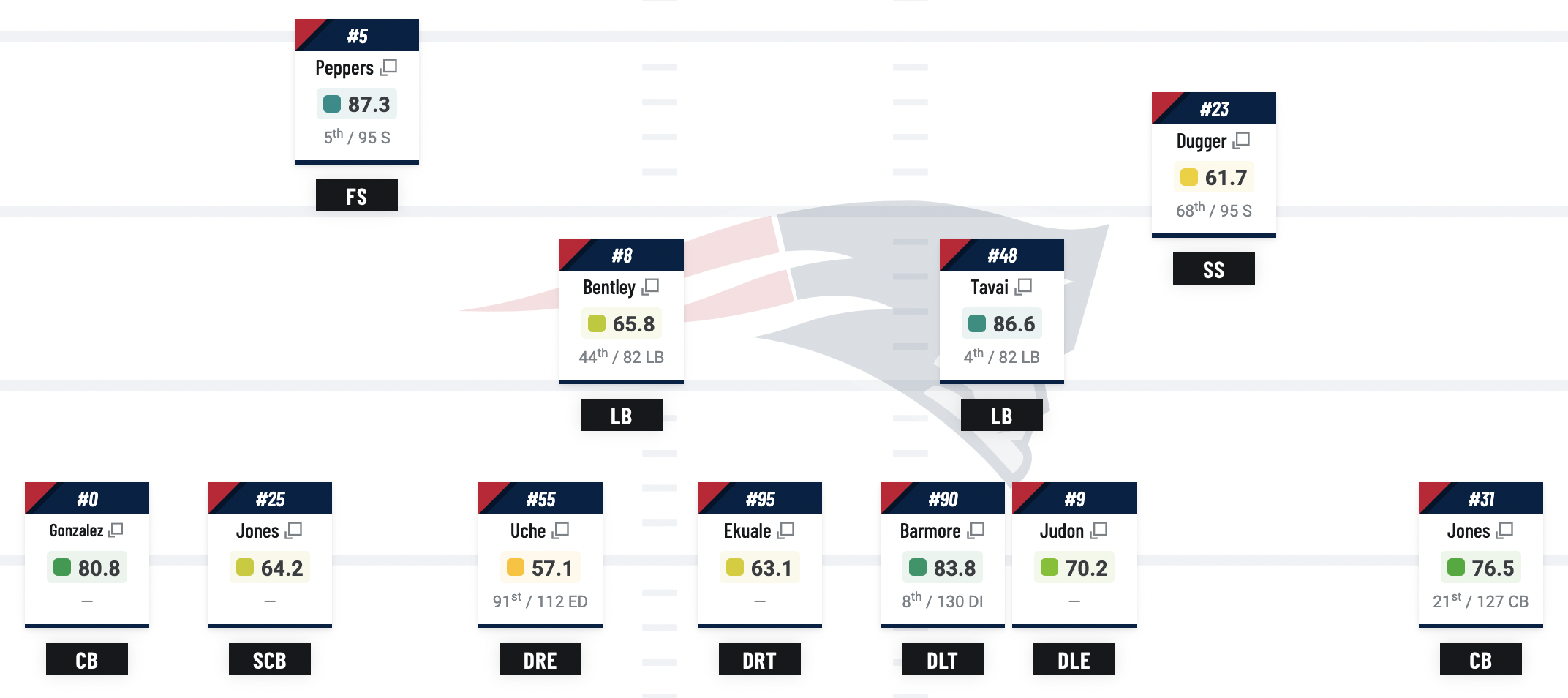
Buffalo’s defensive line is a group stronger on name recognition than on consistently impactful play. Von Miller looked like a shadow of himself in 2024 and may simply have stayed too long at the fair.
Ed Oliver had the best season of his NFL career, but it earned him only a 67.8 PFF overall grade because of his 55.4 run-defense grade.
Greg Rousseau has emerged as a very good player, and re-signing DaQuan Jones was a big move, given the play he displayed before getting hurt last season.
The Seahawks’ defensive line may be readying itself for a big step forward, simply because of the incoming coaching staff under Mike Macdonald. The methodology of the new system allows players to play with greater speed and less thinking time, potentially leading to big seasons from the likes of Leonard Williams, Boye Mafe and Uchenna Nwosu.
Rookie Byron Murphy II could also hit the ground running on the inside.
Dexter Lawrence is a unique player, winning at a greater rate and with far more volume than any other nose tackle in the game when rushing the passer. Adding Brian Burns in the offseason gives the Giants a much better threat on the edge, and now the team needs Kayvon Thibodeaux to take a step forward. Though he got into double-digit sacks in Year 2, he had just 43 quarterback pressures from 520 pass-rushing snaps and his PFF pass-rushing grade declined from his rookie season.
Last season resulted in unexpected down years from the interior duo of Jonathan Allen and Daron Payne. Allen led the team in quarterback pressures, with 49, but it was his worst PFF pass-rushing grade since 2019 and the worst overall grade of his career.
Rookie Johnny Newton will hope to force his way into the rotation inside and make some noise, but the big issue for this team is on the edge, where new free agent Dorance Armstrong may be the most proven commodity.
There is significant potential on the defensive line for Tampa Bay, but far more potential than guaranteed production. Vita Vea is by far the group’s best player, and even Vea doesn’t consistently match his highlight reel. Fourteen defensive tackles earned a better PFF run-defense grade than him last season, and 39 notched more pressures, including 355-pound nose tackle Michael Pierce.
Calijah Kancey has big-time pass-rushing potential inside, while Randy Gregory, Yaya Diaby and Joe Tryon-Shoyinka, along with rookie Chris Braswell, could all generate pressure.
Jeffery Simmons is an outstanding player on the interior, but he lacks the help around him. Arden Key and Harold Landry are solid players who will rack up pressures but aren’t true difference-makers, each posting a PFF grade under 70.0 in 2023.
Mammoth rookie defensive tackle T’Vondre Sweat is an exciting prospect, as his tape flashes special potential, but he is still an unknown.
The Chargers are likely getting diminished versions of their best players — Joey Bosa and Khalil Mack — in 2024. Between injuries and age, neither player is as good as they were at their peak, and outside of that duo, the defensive line doesn’t offer much.
Tuli Tuipulotu could help to offset that in Year 2, as he registered more than 50 quarterback pressures in his rookie season, albeit on a significant workload of 444 pass-rushing snaps.
The Rams will have to contend without Aaron Donald for the first time in a decade, and beyond the obvious impact that he brought with his production, they will experience life without every offense they face specifically game-planning for him every week. What does that look like when the attention usually reserved for Donald is shared around the rest of the line more equitably?
Kobie Turner was phenomenal in the second half of his rookie season, and the Rams are now absolutely loaded with youth up front, but that means inexperience and uncertainty, too.
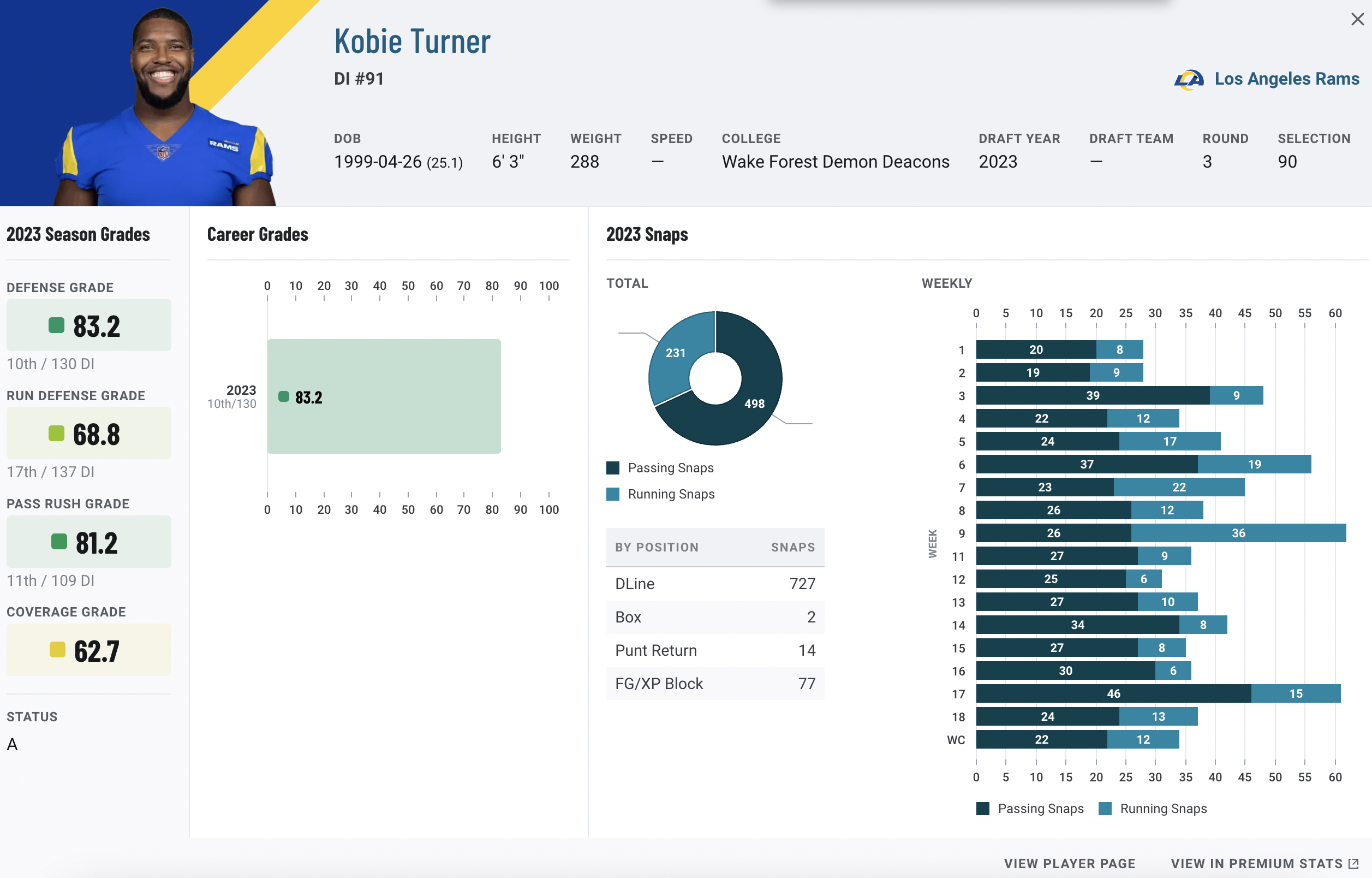
Cameron Jordan is still an outstanding run defender, but last season represented his third straight year with a PFF pass-rushing grade below 70.0, and he managed fewer than 50 pressures for the second season in a row. With Jordan, Carl Granderson and now Chase Young in situ, the Saints could create significant pressure off the edge, but it’s no guarantee.
Inside, the hope rests on a second-year breakout from Bryan Bresee, who recorded just 31 quarterback pressures and a 30.1 PFF run-defense grade as a rookie.
The loss of Christian Wilkins removes arguably Miami’s best player from this group, and they said goodbye to Andrew Van Ginkel after his career year. Miami is also dealing with every edge rusher of significance coming off an injury late in the season.
Zach Sieler is an extremely underrated player inside, and Calais Campbell can still be effective, but this is a group long on questions.
Jacksonville brought back Josh Allen, by far the team’s best defensive lineman, this offseason. Allen has been the one high draft pick spent on the defensive line in recent years that has actually paid dividends, and he accounted for 90 quarterback pressures in 2023.
Travon Walker may have managed double-digit sacks, but he earned just a 58.1 PFF pass-rushing grade and was worse against the run.
Arik Armstead will add real production on the inside and may help in developing Walker, given his own rare physical traits.
Chicago’s defensive line improved massively with the addition of Montez Sweat, who provided a real and consistent source of pressure after the team traded for him at the deadline. Sweat tallied 64 quarterback pressures last season, but the Bears’ defensive line will be determined by the growth in Year 2 of defensive tackles Gervon Dexter and Zacch Pickens. Dexter flashed playmaking ability as a rookie, but the Bears need more from him in 2024.
David Onyemata is a very good player on the inside, and Grady Jarrett was once one of the best in the league, even if he hasn’t hit that level for some time. Outside of that duo, the Falcons don’t offer much up front.
Young players Zach Harrison, Ruke Orhorhoro and Bralen Trice may surprise, but this is a unit that looks like it will struggle again in 2024.
Trading away Brian Burns leaves the Panthers with Derrick Brown and Jadeveon Clowney in the way of proven commodities. Brown was dominant last season but makes his biggest impact in the run game, while Clowney is consistently inconsistent, enjoying elite games before disappearing.
Unlike some other teams down the rankings, this team is low on young players with high-end potential to spin things optimistically.
The Vikings’ offseason free agency swap of Danielle Hunter for Jonathan Greenard was likely a downgrade, even if they got younger and cheaper in the process. Andrew Van Ginkel earned a 91.1 PFF overall grade last season, but that was a massive outlier in a career that has typically seen him post grades in the 60s and 70s.
Rookie Dallas Turner will have high expectations, but the interior of this line is a weakness.
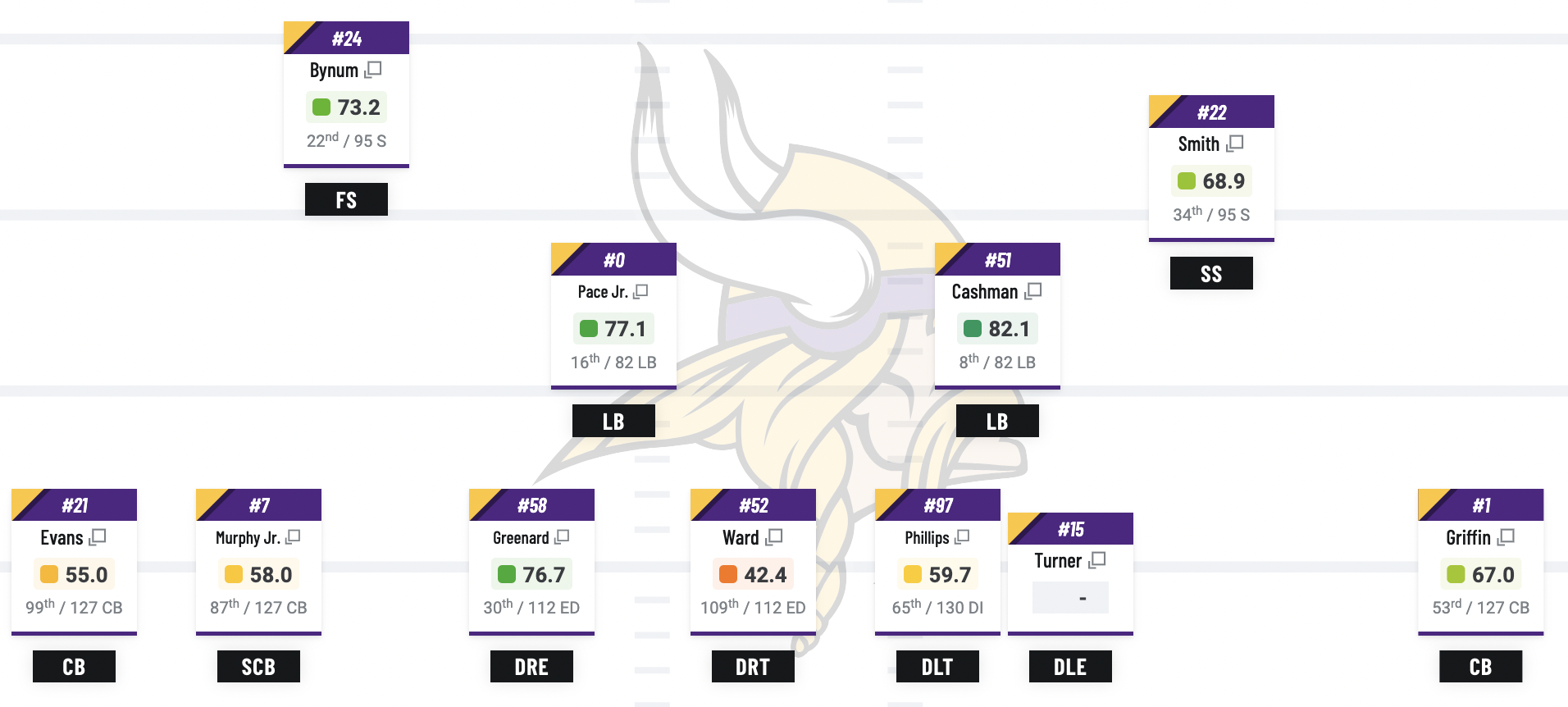
The Jets felt John Franklin-Myers was expendable, but he may walk onto the Broncos as their best defensive lineman. Nothing better illustrates the gulf between the top and bottom of these rankings.
Baron Browning, Nik Bonitto and Jonathon Cooper have all flashed pressure from the edge, but none has remained consistent. Zach Allen is solid but not the player the Broncos paid for, and rookie Jonah Elliss could force his way into the reckoning sooner rather than later.
Rookie Darius Robinson has every chance to be the Cardinals’ best defensive lineman immediately, which says everything about where this group is. Dennis Gardeck had a career year last season, with 42 quarterback pressures and six sacks, but he had typically been a special teams stud until that point. Zaven Collins is a converted off-ball linebacker and very much still a work in progress.
The rest of this group would be solid second-teamers but are expected to be starters.